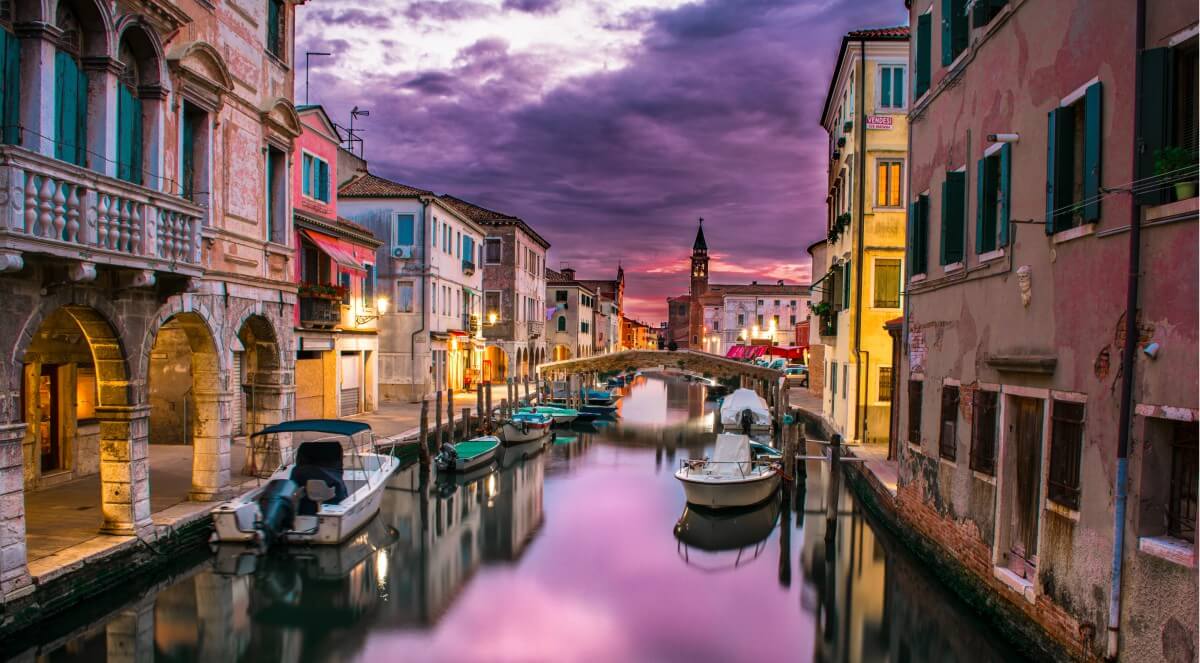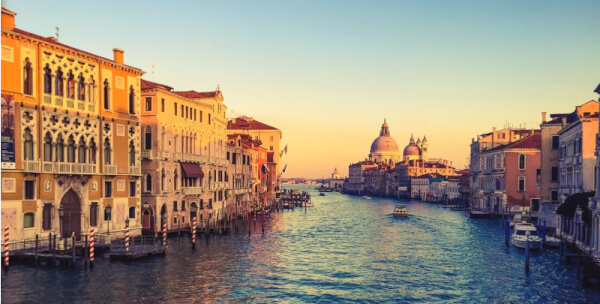Moving to Italy from Australia
Looking to move to Italy from Australia? We'll fill you in on the travel and visa requirements, healthcare, cost of living, pros, cons and much more.

Have you ever considered moving abroad? There are a ton of valid reasons to do so. You could be looking for a new job or going to school. You could be following a family member or loved one who’s making a move. You could be getting ready to retire. Or you could just be looking for adventure or a change in your usual routine.
Whatever your reason for making the move to a new country, you’ve might have considered Italy. It’s one of the most popular tourist destinations in the world, and thinking about living there can fill your head with images of eating pasta, swirling glasses of wine, walking among beautiful historic buildings and spending the weekends going to world-class museums. Italy offers all of that, sure, but what are the downsides to living there? Every country has its own set of pros and cons. Here are some to consider before moving to Italy.
Italy wouldn’t be such a popular tourist destination if it wasn’t a special place and it definitely has a lot going for it. There can be many reasons you might want to move there, like these:

Like many European nations, Italy has a national health insurance system. It’s ranked in the top 10 healthcare systems in the world by the World Health Organization for its quality care. Almost all medical expenses are covered, meaning there are no out-of-pocket costs. While there’s sometimes overcrowding or wait times at public hospitals, healthcare in Italy is overall efficient and definitely affordable.

Italians structure their entire days around food, and it’s one of the favorite topics of conversation for native Italians. There’s the pasta, the pastries, the espresso, the gelato, the pizza, and so much more. If you think you love Italian food in your home country, wait until you have the real thing in Italy. It’s no wonder Italian food is sold in restaurants just about everywhere in the world — it’s delicious, classic comfort food. Italy has a culture of using fresh, high-quality ingredients as well, which only makes the food even better. Be ready to tuck in if you decide to move to Italy.

Like most countries, becoming eligible for citizenship in Italy has residency requirements. However, while the standard is 10 years before you can apply for Italian citizenship, that can be reduced to as little as four years if you have some Italian heritage. If your parents or grandparents are Italian, you may have no residency requirement at all. If you dream of becoming a citizen in Italy, it may be closer and easier than you think.

Italians love to stay out late. Italy’s cities boast thriving club and dining scenes, and Italy is home to an absolutely charming custom called the Passagiata, or the stroll. That’s when people dress up and take a long stroll up and down the main drag, eating gelato along the way, just to see and be seen. At the end of your passagiata, you can grab an espresso or a drink and watch the others who are out for a stroll, chatting with friends and family the whole time.

While you technically need to have a valid residence permit to buy property in Italy, there are some big exceptions. If you come from a “reciprocity country” that allows Italians to buy property, you can buy property in Italy without a residence permit (this applies to Americans). This is good news since 70% of Italians own their homes, and you’re trying to assimilate with the local culture, right?

Public schools in Italy are free for all kids, and they start learning to read and write when they’re only three years old. Kids are given a very well-rounded education in Italian schools, which includes art and history education, as both subjects are considered very important. Italy’s universities are world class in quality, but they may be expensive for non-residents.

Italy has a reputation for being an expensive place, but once you actually live there, you’ll find that monthly costs aren’t too exorbitant. Average yearly expenses for a single person (excluding rent) come in under €10,000, even in cities like Rome and Milan. And even large apartments in city centers can often be found for under €1,000 per month. Salaries in many industries will more than cover the average cost of living in Italy, meaning most people are able to live pretty comfortably.

As long as you have all the necessary documentation (which includes valid proof of identity and proof of your address), you don’t even need to be an Italian resident to open a bank account in Italy. Unfortunately, though, you will almost never be able to open an Italian bank account online, especially as a foreigner, so you won’t be able to open your account until you can do it in person once you’re on the ground in Italy.
Nowhere in the world is perfect, and that includes Italy. There are some downsides to living there, and you’ll have to consider those before you make a choice to move. Here are some things to keep in mind that aren’t so great about Italy:

If you’re going to settle in Italy, you’d better be absolutely sure you want to stay for a while. While “transitory” leases up to 18 months long exist, long-term apartment leases are generally for a minimum of three years. Some leases are are even for four years instead. If you rent an apartment in Italy and decide it’s not for you, you may be stuck unless you break your lease contract, and that can be costly.

Italy’s unemployment rate is a little high, compared to other parts of Europe. As of August 2017, unemployment was at 11.2%, so if you’re planning on finding a job in Italy, it might take you a little while to land something.

In Italy’s bigger cities, graffiti is common, and overcrowding plus tourists equals a lot of grime. Even though many neighborhoods are historic with beautiful architecture, it may be hard to see that through the dirt.

Because Italy is a fairly large country that stretches from north to south, different parts of the country have very different weather. The mountainous north has cold, wet winters, while the mediterranean south is much more mild in winter, but can get hot and dry during the summer months. No matter where you live in Italy, you probably won’t have consistent weather year-round.

There are a fair number of English-speakers in the bigger cities in Italy, but in the smaller villages out in the countryside, very few people speak English. National pride runs deep, and that means the locals stick to speaking Italian. But hey, that’s a good excuse to learn a new language, right?

If you plan to start a business in Italy and you’re not from another EU country, you have to apply for a self-employment visa. However, there are no fixed requirements for qualifying, and visas are granted on a case-by-case basis. That means you might have to invest some time and effort into the process without knowing whether you even qualify.
 If you need to send money to or from Italy, using your bank or a traditional money transfer service means you’ll routinely have to pay for a markup of 4-5% on the exchange rate -- basically a hidden fee banks use to make money on your transfers. With Wise, you can send money at the exact mid-market rate, or the same exchange rate you see when you Google it. All you have to pay is a small, fair transfer fee that’s spelled out upfront, with no hidden fees or markups.
If you need to send money to or from Italy, using your bank or a traditional money transfer service means you’ll routinely have to pay for a markup of 4-5% on the exchange rate -- basically a hidden fee banks use to make money on your transfers. With Wise, you can send money at the exact mid-market rate, or the same exchange rate you see when you Google it. All you have to pay is a small, fair transfer fee that’s spelled out upfront, with no hidden fees or markups.
Wise also offers borderless multi-currency accounts, which allow users to send, receive and manage money in a variety of global currencies all at once, with more currencies being added all the time. And beginning this year, borderless account holders will have access to consumer debit cards, making their money even more accessible no matter where in the world they go. Try Wise today to see how easy it can be to send and use your money all over the world.
As you can see, there are tons of reasons to consider moving to Italy. But there are also reasons why it may not be the perfect home for everyone. Knowing the pros and cons is the first step to choosing a new home where you’ll be happy, and hopefully this gave you a good start. Good luck with your move, wherever you end up, and safe travels!
*Please see terms of use and product availability for your region or visit Wise fees and pricing for the most up to date pricing and fee information.
This publication is provided for general information purposes and does not constitute legal, tax or other professional advice from Wise Payments Limited or its subsidiaries and its affiliates, and it is not intended as a substitute for obtaining advice from a financial advisor or any other professional.
We make no representations, warranties or guarantees, whether expressed or implied, that the content in the publication is accurate, complete or up to date.

Looking to move to Italy from Australia? We'll fill you in on the travel and visa requirements, healthcare, cost of living, pros, cons and much more.

Here’s the lowdown on who can apply and how you go about getting dual citizenship with Italy.

Getting married in Italy is relatively straightforward. Like any wedding though, it requires advanced planning, as well as a basic understanding of the law....

So, you’ve watched La vita è bella (Life Is Beautiful, 1977) one too many times and have decided to move to Italy. Great choice, although hopefully you have...

It might be Italy’s second city, but Milan is the heart of the country when it comes to finance and fashion. The large financial sector in particular means...

Italy is famed for its culture, food and lifestyle, making it no surprise that many foreigners move there to live and work, both in the large cities and off...